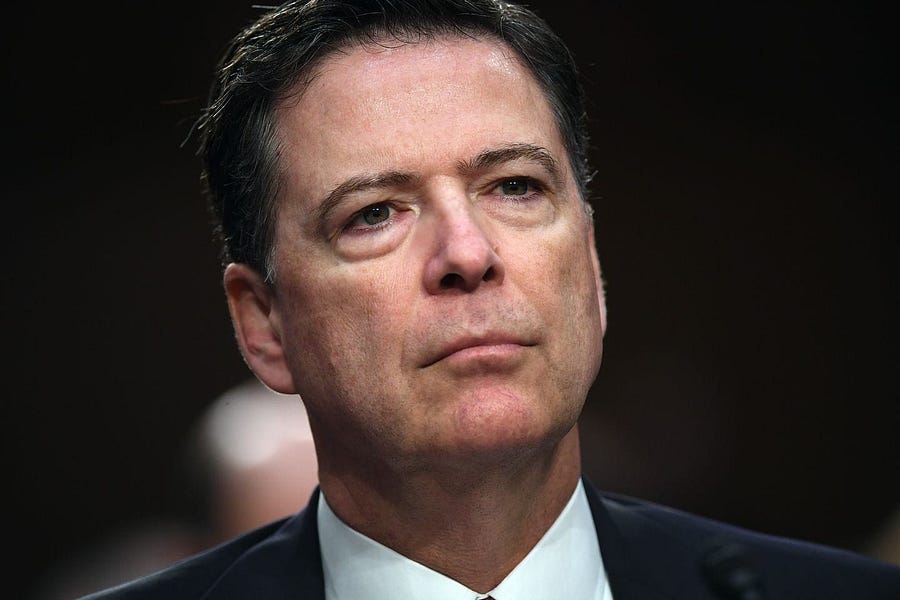Justice Department Inspector General Michael Horowitz finally released on Monday his much-anticipated report examining the origins of the FBI investigation into the Trump campaign and Russia during the 2016 election. Unsurprisingly, both critics and allies of the FBI were quick to claim victory in the wake of the report, despite the fact it spanned 430 pages.
In a tweet published less than three hours after the report was released, former FBI Director James Comey categorized the accusations of impropriety by the bureau under his leadership as “all lies,” claiming the FBI was full of “just good people trying to protect America.”
Although the report’s topline findings—chiefly that the decision to open the investigation was motivated neither by political biases nor the notorious Steele dossier, that no evidence showed that the FBI used undercover or confidential sources to “interact with members of the Trump campaign prior to the opening of the Crossfire Hurricane investigation,” and that the FBI did not place any such sources “within the Trump campaign”—clear the FBI of the most egregious offenses of which it was accused, Horowitz did identify several glaring errors or lapses in judgment on behalf of the bureau.
The report describes the process by which the FBI investigators, referred to as the Crossfire Hurricane team, submitted several FISA applications related to Trump adviser Carter Page as highly flawed and lacking relevant information. “The Crossfire Hurricane team failed to inform Department officials of significant information that was available to the team at the time that the FISA applications were drafted and filed,” the report states. “Much of that information was inconsistent with, or undercut, the assertions contained in the FISA applications that were used to support probable cause and, in some instances, resulted in inaccurate information being included in the applications.”
The report also highlighted conflicting views of the relationship between former British intelligence officer Christopher Steele and the FBI. While the FBI viewed Steele as “a former intelligence officer colleague and FBI CHS [confidential human source], with obligations to the FBI,” Steele himself told Horowitz and his team “he was a businessperson whose firm … had a contractual agreement with the FBI and whose obligations were to his paying clients, not the FBI.” This discrepancy, Horowitz wrote, “affected the FBI’s control over Steele during the Crossfire Hurricane investigation,” and “led to divergent expectations about Steele’s conduct in connection with his election reporting.”
What’s more, even as the FBI received information that threw some of Steele’s reporting into doubt, the bureau, according to Horowitz, did not reassess what he told them, and did not “aggressively seek to obtain” additional important information from him. It then used Steele’s reporting as basis for submitting the first FISA application into Carter Page.
The report goes on to detail 17 inaccuracies or omissions on the part of the FBI related to FISA applications into Carter Page. One application, for example, excluded the fact that Page had previously been approved as an “operational contact” with Russia by another U.S. government agency. The FBI also “overstated the significance of Steele’s past reporting” for the bureau and omitted that even he warned them some of his information came from a “boaster” who “may engage in some embellishment.” Taken altogether, Horowitz concluded that the failures described in his report “represent serious performance failures by the supervisory and non-supervisory agents with responsibility over the FISA applications.”
All that being said, Horowitz did not ultimately determine that these wrongdoings or shortcomings materially affected the FBI’s decision to launch the probe or the investigation’s subsequent findings. And again, the IG report did not find instances of wiretapping, infiltration, or other spying on the Trump campaign. But criticisms of the bureau’s handling of the investigation have not been, as Comey claimed, “all lies.”
—Fact check by Declan Garvey.







Please note that we at The Dispatch hold ourselves, our work, and our commenters to a higher standard than other places on the internet. We welcome comments that foster genuine debate or discussion—including comments critical of us or our work—but responses that include ad hominem attacks on fellow Dispatch members or are intended to stoke fear and anger may be moderated.
You are currently using a limited time guest pass and do not have access to commenting. Consider subscribing to join the conversation.
With your membership, you only have the ability to comment on The Morning Dispatch articles. Consider upgrading to join the conversation everywhere.